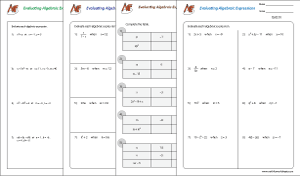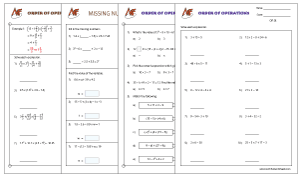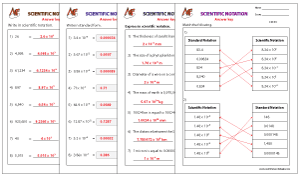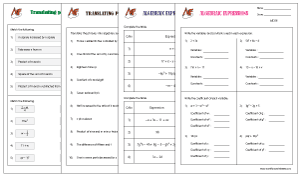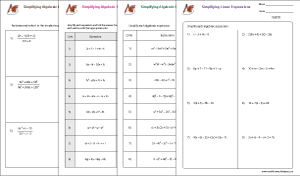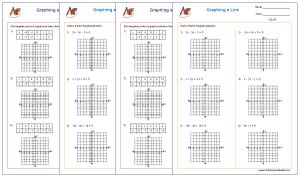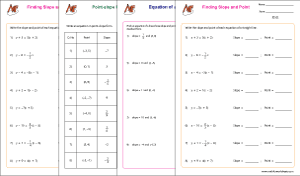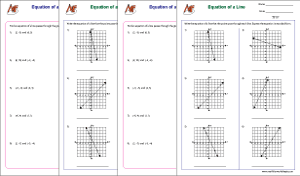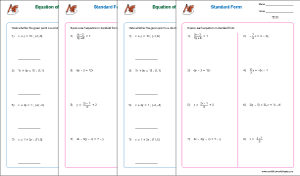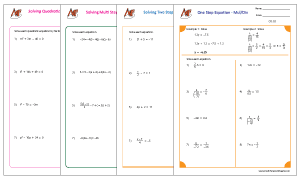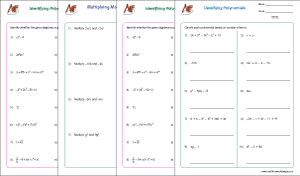Browse by Topics
- English Worksheets
- Kid's Corner
- Numbers & Operations
- Addition
- Subtraction
- Multiplication
- Division
- Decimals
- Place Value
- Roman Numerals
- Skip Counting
- Odd & Even Numbers
- Patterns
- Cardinal & Ordinal Numbers
- Rounding Numbers
- Estimation of Numbers
- Estimation of Time & Money
- Counting & Cardinality
- Comparing Numbers
- Ordering Numbers
- Fractions
- Prime & Composite Numbers
- Squares & Cubes
- Divisibility Rules
- Factors & Multiples
- Data Handling
- Algebra
- Ratio
- Proportion
- Order of Operations
- Scientific Notation
- Exponents
- Algebraic Expressions
- Evaluating Algebraic Expressions
- Simplifying Algebraic Expressions
- Graphing Lines
- Point Slope Form
- Two Point Form
- Two Intercept Form
- Equations
- Identifying Functions
- Evaluating Functions
- Function Table
- Domain and Range
- Trigonometric Charts
- Quadrants
- Polynomials
- Measurement
- Geometry
- Word Problems
Algebra
Algebra, an interesting branch of Mathematics is where we use English alphabet along with numbers. This advanced Math can describe many types of real- world phenomenas which you will be learning here. Skills to express Algebraic equations, evaluate expressions, solve one-step, two- step and multi- step equations, Inequalities, and many more are covered in this section.
Algebra is fun!!! You will get to know it here.
Quick links to the topics listed below : Scientific Notation , Order of Operations , Algebraic Expressions
Algebra Worksheets
-
Ratio
View AllRatio is used to compare two or more quantities of the same units thereby indicating how much of one quantity is present in the other quantity. There are two types of ratio – part to part ratio and part to whole ratio. Part to Part is between two quantities whereas Part to Whole is for a group. Ratio between two quantities say x and y is represented as x : y . This can be read as ‘x is to y‘.
-
Order of Operations
View AllOrder of Operations, as the name suggests, is the order in which operations like addition, subtraction, multiplication and division need to be performed. Let us simply follow PEDMAS. PEDMAS is the acronym for Parentheses, Exponents, Division/ Multiplication, Addition/ Subtraction. Here are a number of worksheets to learn and perform arithmetic operations in order.
-
Scientific Notation
View AllScientific Notation is used to easily handle very large and very small numbers. It is much easy to express numbers in powers of 10 instead of writing or calculating large values as such. It is to be kept in mind that the shortened number is between 1 to 10 and then multiplied in powers of 10. This form is generally used by scientists, engineers and mathematicians.
-
Forming Algebraic Expressions and Translating Phrases
View AllAlgebraic expressions involves variables and constants. Using these variables, constants and arithmetic operations, a statement or a phrase can be translated into algebraic expression. Similarly, an expression be translated into a statement. These worksheets teach you to frame algebraic expressions and to translate phrases.
-
Evaluating Algebraic Expressions
View AllCreating a worksheet focused on evaluating algebraic identities can be a useful way for students to practice simplifying expressions based on known identities. These worksheets are specially designed for Grades 7 and 8. Use the links below to download the worksheets.
-
Simplifying Algebraic Expressions
View AllThese free printable worksheets help the students to practice simplifying algebraic expressions. It contains problems involving simplifying linear expressions with power and multiple variables. Different types of questions are available here for practice.
-
Graphing Lines
View AllCertainly! Graphing lines involves plotting points that satisfy the given linear equation and then connecting those points to visualize the line. Remember, the slope-intercept form (y = mx + b) is just one way to graph lines. You can also graph lines using other forms, such as point-slope form or standard form, depending on the information provided in the equation.
-
Point Slope Form
View AllPoint-slope form is another way to represent the equation of a line. It uses a specific point on the line and the slope of the line to define the equation. The point-slope form of a linear equation is:
y – y₁ = m(x – x₁)
Grades 7 and 8 students can use these worksheets.
-
Two Point Form
View AllThe two-point form is another way to represent the equation of a line. This form uses two distinct points on the line to determine the equation. The two-point form of a linear equation is:
(y – y₁)/(y₂ – y₁) = (x – x₁)/(x₂ – x₁)
-
Two Intercept Form
View All“Two-intercept form” of a linear equation, also known as the “intercepts form” or “x-intercept and y-intercept form.” This form is not as commonly mentioned as the slope-intercept or standard forms, but it’s a valid way to represent a linear equation. It’s especially useful when you know the x-intercept and y-intercept of a line.
-
Equations
View AllIn Algebra, Equations play a very important role. One step equation, two step equation and multi-step equation worksheets are available here. Graphing linear equation and solving quadratic equation worksheets are also available here for practice.
-
Polynomials
View AllPolynomials are mathematical expressions made up of variables, coefficients, and exponents. They involve addition, subtraction, multiplication, and non-negative integer exponents. Polynomials can represent a wide range of mathematical functions and are an essential concept in algebra.

